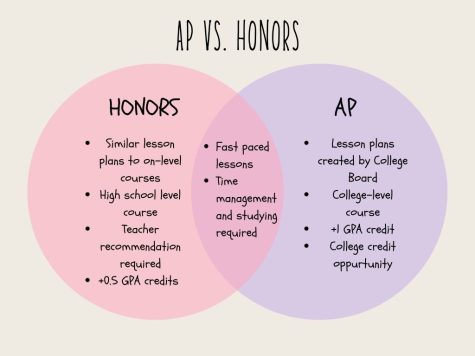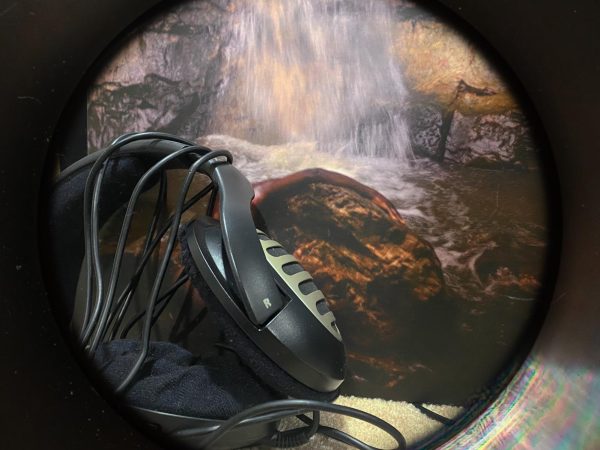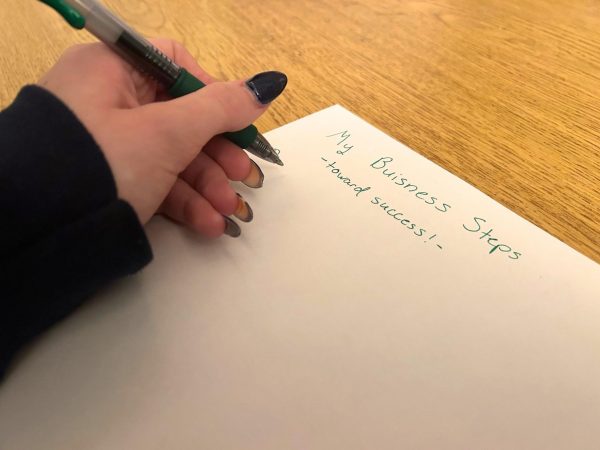A guide to honors and AP courses
High school students earn the opportunity to partake in honors and Advanced Placement (AP) courses. These classes allow students to test their knowledge, expand their intellect and boost their overall abilities in an academic field. AP and honors classes offer additional incentives such as extra GPA points, college credit and well-rounded college applications. Although these courses provide exemplary incentives, understanding the challenges and possible negative aspects of taking AP and honors will help students make correct choices when deciding which courses to select.
December 5, 2022
As students enter high school, the burden of college preparation, deciding which classes to take and managing stress levels becomes exceptionally grueling. Understanding rigor and taking courses that fit individual abilities will tremendously help scholars set up their future after high school. Understanding the difference between honors and Advanced Placement (AP) classes becomes an issue that harms scholars once they reach their senior year. Taking the wrong number of AP or honors classes can negatively affect students toward the end of their high school careers and place them in unhelpful positions when applying for college.
Honors classes
In hopes of an extra challenge within their learning, students can join honors courses. Those who receive a previous teacher’s recommendation or maintain a high grade point average (GPA) can join honors, but the participating students will face in-depth lessons from instructors. These classes require participants to maintain academic motivation and time-management skills and tackle hasty assignments. The content does not differ from an on-level course, but scholars will face sudden lessons and higher expectations from their teachers. As a reward for completing such a rigorous class, those who finish receiving 0.5 points added to their GPA; a student who received a 2.5 would instead receive a 3.0 as their final GPA.
While school boards consider honors an advanced system, AP courses include material that will considerably provide a taxing challenge to the average partaker. All scholars should try honors to test their ability in a demanding academic setting.
“It mostly depends on the person and how someone learns best but I would say honors classes are worth taking because not only do they boost GPA, but they are faster paced. I think if someone doesn’t like faster-paced classes then honors classes wouldn’t be the best pick,” junior Amsha Shastrula said.

AP classes
College Board, a non-profit organization that organizes college preparation and study material for high school students, created Advanced Placement (AP) for students interested in extra practice for college. AP courses provide college-level instruction to the average high school setting. In addition, high school teachers receive training from College Board professionals to ensure a specific way of teaching. As a result, the class material differs significantly from an honors or on-level setting.
Studying, planning and time management will remain at the top of their priority list when attending AP courses. Unlike honors, a student will only succeed by setting aside time every day to study for tests. The College Board creates the students’ tests within the class, ensuring that scholars prepare for the yearly AP exams. After completing an AP course, scholars can take an end-of-the-year exam that will test the scholars on everything they learned during the school year. If the student receives a 3 to a 5 on the exam, they receive a passing score and college credits.
“Taking too many [AP] classes could definitely harm a student with their mental health because they start to worry more about their grades and the stress and workload of the classes can be a lot. If someone is taking too many APs then it’s more harmful to their GPA because the more APs someone takes, the more workload there is and there’s less concentration on each of the individual classes. To be ready for college, I think a student should take 8-10 APs throughout their high school career,” Shastrula said.
Students should tread lightly when considering AP. These classes allow participants to understand and engage in college-level teachings and open opportunities to earn additional college credits. The benefits of this type of class unquestionably appear appealing, but AP courses can cause mass amounts of stress and the possibility of a failing grade. Instead, students should try taking AP within subjects they usually succeed in or one directly related to their possible college major. Colleges look for students who take the most AP courses within their high school careers. Selective schools usually choose students who participated in 7-12 APs.
“The amount of work and pressure that’s put on you by yourself, your peers, your parents or whoever is a crushing amount. It also has the title of being an AP class which has the connotation of being for the smart people, but you don’t have to be. I mean, we’re [classmates] so young, and I don’t think people realize just how crazy it is that we are taking like four or five or more AP classes per year. That is an insane amount, and it’s okay to ask for more than we can do to push us to be the best that we can be. And I feel like having so many APs is creating an environment that we are not built or prepared for because instead of having this transition from middle school to high school to college, it is now middle school, freshman year, college,” junior Claire Isbitts said.

















